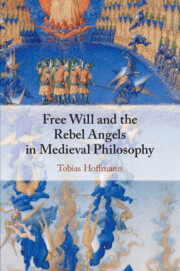Book contents
- Free Will and the Rebel Angels in Medieval Philosophy
- Free Will and the Rebel Angels in Medieval Philosophy
- Copyright page
- Dedication
- Contents
- Acknowledgments
- Abbreviations
- Citation Method
- Introduction
- Part I Free Will
- Chapter 1 Free Will with and without Aristotle
- Chapter 2 The Psychological Turn and the Rise of Intellectualism
- Chapter 3 Voluntarism and the Condemnation of Intellectualism
- Chapter 4 Intermediary Theories and Strict Intellectualism
- Chapter 5 Refinements and Radicalizations
- Part II Whence Evil?
- Part III Angelic Sin
- Bibliography
- Index of Manuscripts
- Index
Chapter 4 - Intermediary Theories and Strict Intellectualism
from Part I - Free Will
Published online by Cambridge University Press: 26 November 2020
- Free Will and the Rebel Angels in Medieval Philosophy
- Free Will and the Rebel Angels in Medieval Philosophy
- Copyright page
- Dedication
- Contents
- Acknowledgments
- Abbreviations
- Citation Method
- Introduction
- Part I Free Will
- Chapter 1 Free Will with and without Aristotle
- Chapter 2 The Psychological Turn and the Rise of Intellectualism
- Chapter 3 Voluntarism and the Condemnation of Intellectualism
- Chapter 4 Intermediary Theories and Strict Intellectualism
- Chapter 5 Refinements and Radicalizations
- Part II Whence Evil?
- Part III Angelic Sin
- Bibliography
- Index of Manuscripts
- Index
Summary
Chapter 4 studies three theories of free will of the late thirteenth century: two that are midway between intellectualism and voluntarism, and one that is strictly intellectualist. Giles of Rome starts from the intellectualist assumption that the cognized object causes the will’s act, but makes a voluntarist concession in assuming that the will controls which aspects of the object end up moving the will. John of Morrovalle (also known as John of Murro) starts from the idea that the will moves itself, but makes the intellectualist concession that the cognized object causes a disposition in the will that predisposes the will in making a choice. Godfrey of Fontaines rejects both solutions and argues that the cognized object alone causes the will’s act. While Giles and Morrovalle grant the will some direct control of its choices, Godfrey considers control necessarily mediated by practical deliberation. In the last analysis, Godfrey leaves the question of how we control our deliberation unanswered.
- Type
- Chapter
- Information
- Free Will and the Rebel Angels in Medieval Philosophy , pp. 93 - 118Publisher: Cambridge University PressPrint publication year: 2020

